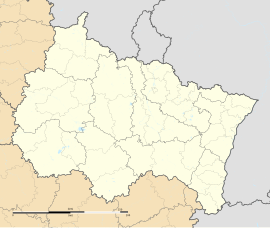You can help expand this article with text translated from the corresponding article in French. (March 2011) Click [show] for important translation instructions.
|
Vitry-le-François (French pronunciation: [vitʁi lə fʁɑ̃swa] ) is a commune in the Marne department in northeastern France. It is located on the river Marne and is the western terminus of the Marne–Rhine Canal. Vitry-le-François station has rail connections to Paris, Reims, Strasbourg, Metz, Dijon and several regional destinations.
Vitry-le-François | |
|---|---|
Subprefecture and commune | |
 The town hall in Vitry-le-François | |
| Coordinates: 48°43′32″N 4°35′07″E / 48.7256°N 4.5853°E | |
| Country | France |
| Region | Grand Est |
| Department | Marne |
| Arrondissement | Vitry-le-François |
| Canton | Vitry-le-François-Champagne et Der |
| Intercommunality | Vitry, Champagne et Der |
| Government | |
| • Mayor (2020–2026) | Jean-Pierre Bouquet[1] |
Area 1 | 6.45 km2 (2.49 sq mi) |
| Population (2021)[2] | 11,454 |
| • Density | 1,800/km2 (4,600/sq mi) |
| Time zone | UTC+01:00 (CET) |
| • Summer (DST) | UTC+02:00 (CEST) |
| INSEE/Postal code | 51649 /51300 |
| Elevation | 105 m (344 ft) |
| 1 French Land Register data, which excludes lakes, ponds, glaciers > 1 km2 (0.386 sq mi or 247 acres) and river estuaries. | |
History
editThe present town is a relatively recent construction, having been built in 1545 at the behest of King Francis who wished to replace, on a new site, Vitry-en-Perthois, which in 1544 had been entirely destroyed as part of the backwash from the king's Italian War of 1542–46.[3] The new Vitry was to be a modern city, constructed according to a plan produced by Girolamo Marini. The king's role in its creation resulted in Vitry-le-François receiving the king's name as part of its own name.
At the beginning of World War I in August 1914, Joseph Joffre established the Grand Quartier Général at the Place Royer-Collard.
In 1961, a terrorist attack took place on a train going between Strasbourg and Paris.
Demography
edit
|
| ||||||||||||||||||||||||||||||||||||||||||||||||||||||||||||||||||||||||||||||||||||||||||||||||||||||||||||||||||
| |||||||||||||||||||||||||||||||||||||||||||||||||||||||||||||||||||||||||||||||||||||||||||||||||||||||||||||||||||
| Source: EHESS[4] and INSEE[5] | |||||||||||||||||||||||||||||||||||||||||||||||||||||||||||||||||||||||||||||||||||||||||||||||||||||||||||||||||||
Features
edit- Its church of Notre-Dame is a 17th-century building with fine 18th-century monuments.
- A convent of the Récollets was later converted to contain the town hall, the court-house, a library and a small museum.
- There is a bronze statue of Pierre Paul Royer-Collard (1763–1845), the politician and philosopher, a native of the district.[6]
Twin towns
editVitry-le-François is twinned with:
- Tauberbischofsheim, Germany, since 1961
Personalities
edit- René Gateaux (1889–1914), mathematician
- Guy Georges (born 1962), serial killer
- René Herbin (1911–1953), classical pianist
- Abraham de Moivre (1667–1754), mathematician
- Étienne-Gabriel Morelly (1717–1778), proto-communist philosopher
- Simhah ben Samuel of Vitry (fl. c. 1100), Talmudist
Climate
edit| Climate data for Vitry-le-François (Frignicourt) (1991–2020 normals, extremes 1974–present) | |||||||||||||
|---|---|---|---|---|---|---|---|---|---|---|---|---|---|
| Month | Jan | Feb | Mar | Apr | May | Jun | Jul | Aug | Sep | Oct | Nov | Dec | Year |
| Record high °C (°F) | 16.6 (61.9) |
21.1 (70.0) |
26.0 (78.8) |
29.1 (84.4) |
34.0 (93.2) |
37.1 (98.8) |
41.7 (107.1) |
40.3 (104.5) |
34.5 (94.1) |
29.4 (84.9) |
23.3 (73.9) |
17.7 (63.9) |
41.7 (107.1) |
| Mean daily maximum °C (°F) | 6.5 (43.7) |
7.9 (46.2) |
12.3 (54.1) |
16.3 (61.3) |
20.1 (68.2) |
23.5 (74.3) |
26.1 (79.0) |
25.9 (78.6) |
21.5 (70.7) |
16.3 (61.3) |
10.3 (50.5) |
7.0 (44.6) |
16.1 (61.0) |
| Daily mean °C (°F) | 3.7 (38.7) |
4.4 (39.9) |
7.6 (45.7) |
10.7 (51.3) |
14.6 (58.3) |
17.7 (63.9) |
19.9 (67.8) |
19.7 (67.5) |
15.9 (60.6) |
12.0 (53.6) |
7.2 (45.0) |
4.4 (39.9) |
11.5 (52.7) |
| Mean daily minimum °C (°F) | 0.9 (33.6) |
0.9 (33.6) |
2.9 (37.2) |
5.1 (41.2) |
9.0 (48.2) |
11.9 (53.4) |
13.7 (56.7) |
13.5 (56.3) |
10.2 (50.4) |
7.6 (45.7) |
4.1 (39.4) |
1.7 (35.1) |
6.8 (44.2) |
| Record low °C (°F) | −22.0 (−7.6) |
−14.8 (5.4) |
−11.1 (12.0) |
−4.9 (23.2) |
−1.5 (29.3) |
2.3 (36.1) |
5.3 (41.5) |
4.1 (39.4) |
1.0 (33.8) |
−3.9 (25.0) |
−10.7 (12.7) |
−16.0 (3.2) |
−22.0 (−7.6) |
| Average precipitation mm (inches) | 55.9 (2.20) |
51.3 (2.02) |
50.5 (1.99) |
47.1 (1.85) |
62.1 (2.44) |
53.3 (2.10) |
59.0 (2.32) |
58.9 (2.32) |
57.3 (2.26) |
65.5 (2.58) |
60.0 (2.36) |
73.7 (2.90) |
694.6 (27.35) |
| Average precipitation days (≥ 1.0 mm) | 11.2 | 10.4 | 10.1 | 8.7 | 10.1 | 9.2 | 8.2 | 7.7 | 8.2 | 10.3 | 11.2 | 12.3 | 117.7 |
| Source: Meteociel[7] | |||||||||||||
See also
editReferences
edit- ^ "Répertoire national des élus: les maires". data.gouv.fr, Plateforme ouverte des données publiques françaises (in French). 2 December 2020.
- ^ "Populations légales 2021" (in French). The National Institute of Statistics and Economic Studies. 28 December 2023.
- ^ Chisholm 1911.
- ^ Des villages de Cassini aux communes d'aujourd'hui: Commune data sheet Vitry-le-François, EHESS (in French).
- ^ Population en historique depuis 1968, INSEE
- ^ One or more of the preceding sentences incorporates text from a publication now in the public domain: Chisholm, Hugh, ed. (1911). "Vitry-le-François". Encyclopædia Britannica. Vol. 28 (11th ed.). Cambridge University Press. p. 151.
- ^ "Normales et records pour Frignicourt (51)". Meteociel. Retrieved 21 November 2024.



